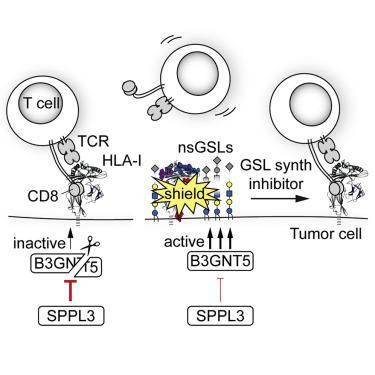Immunity ( IF 25.5 ) Pub Date : 2020-12-02 , DOI: 10.1016/j.immuni.2020.11.003 Marlieke L M Jongsma 1 , Antonius A de Waard 2 , Matthijs Raaben 3 , Tao Zhang 4 , Birol Cabukusta 5 , René Platzer 6 , Vincent A Blomen 3 , Anastasia Xagara 2 , Tamara Verkerk 2 , Sophie Bliss 2 , Xiangrui Kong 2 , Carolin Gerke 7 , Lennert Janssen 5 , Elmer Stickel 3 , Stephanie Holst 4 , Rosina Plomp 4 , Arend Mulder 8 , Soldano Ferrone 9 , Frans H J Claas 8 , Mirjam H M Heemskerk 10 , Marieke Griffioen 10 , Anne Halenius 11 , Hermen Overkleeft 12 , Johannes B Huppa 6 , Manfred Wuhrer 4 , Thijn R Brummelkamp 13 , Jacques Neefjes 5 , Robbert M Spaapen 2

|
HLA class I (HLA-I) glycoproteins drive immune responses by presenting antigens to cognate CD8+ T cells. This process is often hijacked by tumors and pathogens for immune evasion. Because options for restoring HLA-I antigen presentation are limited, we aimed to identify druggable HLA-I pathway targets. Using iterative genome-wide screens, we uncovered that the cell surface glycosphingolipid (GSL) repertoire determines effective HLA-I antigen presentation. We show that absence of the protease SPPL3 augmented B3GNT5 enzyme activity, resulting in upregulation of surface neolacto-series GSLs. These GSLs sterically impeded antibody and receptor interactions with HLA-I and diminished CD8+ T cell activation. Furthermore, a disturbed SPPL3-B3GNT5 pathway in glioma correlated with decreased patient survival. We show that the immunomodulatory effect could be reversed through GSL synthesis inhibition using clinically approved drugs. Overall, our study identifies a GSL signature that inhibits immune recognition and represents a potential therapeutic target in cancer, infection, and autoimmunity.
中文翻译:

SPPL3 定义的鞘糖脂库协调 HLA I 类介导的免疫反应
HLA I 类 (HLA-I) 糖蛋白通过将抗原呈递给同源 CD8 + T 细胞来驱动免疫反应。这一过程经常被肿瘤和病原体劫持以逃避免疫。由于恢复 HLA-I 抗原呈递的选择有限,我们的目标是确定可药物化的 HLA-I 通路靶点。通过迭代全基因组筛选,我们发现细胞表面鞘糖脂 (GSL) 库决定了有效的 HLA-I 抗原呈递。我们发现,蛋白酶 SPPL3 的缺失增强了 B3GNT5 酶活性,导致表面新乳糖系列 GSL 上调。这些 GSL 在空间上阻碍了抗体和受体与 HLA-I 的相互作用,并减少了 CD8 + T 细胞的激活。此外,神经胶质瘤中 SPPL3-B3GNT5 通路紊乱与患者生存率降低相关。我们证明,使用临床批准的药物可以通过抑制 GSL 合成来逆转免疫调节作用。总体而言,我们的研究确定了抑制免疫识别的 GSL 特征,并代表了癌症、感染和自身免疫的潜在治疗靶点。































 京公网安备 11010802027423号
京公网安备 11010802027423号